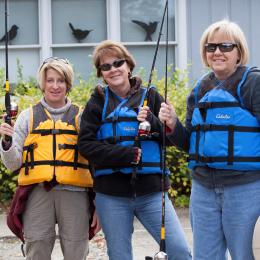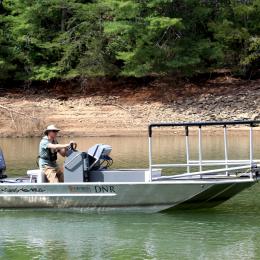
Register/Renew a Boat
 Online
Online
Renew your boat registration or register a boat for the first time.
 1-800-366-2661
1-800-366-2661
Speak with a local representative who can help.
Monday–Friday 8:00 a.m.–6:00 p.m., Saturday–Sunday 9:00 a.m.–5:00 p.m.
 By Mail
By Mail
Send in an application by mail:
Georgia Department of Natural Resources
P.O. Box 934943
Atlanta, GA 31193-4943
- Georgia Boat Registration “How To” Videos
- General Information
- eTitles
- Report Sale
- What to Register
- Fees
- Supporting Documents for Boat Registration
- Bill of Sale
- Documents if Buying/Selling a Used Boat
- Hull Identification Number (HIN)
- Registering/Purchasing an Inherited Boat
- Temporary Boat Registration
- FAQs
Applications & Forms
- Vessel Registration Application
- Bill of Sale Form
- Affidavit of Vessel Ownership Form
- Abandoned Vessel Package
- Default of Security Interest/Transfer Statement Form
- Affidavit of Inheritance Form
- Notification of Sale, Theft, Recovery, Destruction or Abandonment of GA Registered Vessel Form
- Power of Attorney Form
- Security Interest or Lien Form
Georgia Boat Registration “How To” Videos
- How to Register a New Vessel (a.k.a. a vessel from the manufacturer to you)
- How to Register a Used Vessel currently registered in Georgia
- How to Register a Used Vessel from another state
General Information
There are three types of vessel registrations:
- New Georgia Vessel Registration: The vessel has never been registered in Georgia with the Department of Natural Resources. The vessel may be new or used.
- Renewal Vessel Registration: Renewal of a Georgia registered vessel where the name of the boat owner and the registration number have not changed since last registered. Registrations may be renewed any time after October 1 the year before expiration. Registrations allowed to lapse will incur a $10 late fee at renewal. Boat owners are mailed a renewal registration notice once when they have 60 days or fewer remaining on their Georgia vessel registration.
- Transfer Vessel Registration: Change of ownership for a Georgia registered vessel. The existing Georgia registration number (if still available) is transferred to the new owner’s name and the new owner receives a new registration period. The new expiration date is the last day of the new owner's month of birth during the third year of registration. Customers should be sure to update address, email address, and other information.
New owners of boats with unexpired registrations in another person's name must immediately apply for a registration in their name to use the boat on Georgia waters. They may not use the existing registration in the previous owner’s name.
Boat owners should indicate a change of address or change of email online, when talking to the Service Center operator, or on the mailed renewal form.
eTitles
Georgia is an eTitle state for vessels. Once a vessel registration is approved, registered vessels have a Georgia eTitle in the vessel registration system. Boat owners can see an eTitle is present by logging into their account, or may download the BOAT REGISTRATION AND VERIFICATION RECORD which is the official record of eTitle. Outboard motors over 25 hp are included on the record. Although Georgia can produce printed paper titles upon request for a fee, we encourage owners, lienholders, and dealers to use the free eTitle system rather than requesting printed titles. The eTitle makes sale of the boat and re-registration in Georgia simple at a later date and ensures the safety of your title.
If needed, anyone may request a free BOAT REGISTRATION AND VERIFICATION RECORD by visiting the GoOutdoorsGa page.
eTitle Information for States: Georgia became an eTitle state on July 1, 2020. Georgia registered boats may be eTitled in our system, may have a printed title, or may remain untitled if the boat has not been registered / renewed after 6/30/2020. The BOAT REGISTRATION AND VERIFICATION RECORD is the official record showing all information on vessel status including owner information. The data field “Vessel Title Status” may be marked as shown below. If this field is marked “eTitled,” the BOAT REGISTRATION AND VERIFICATION RECORD is the eTitle and is the only record of eTitle produced by Georgia.
|
Vessel Title Status: Not Titled, or Blank |
Vessel has not been renewed or re-registered on or after July 1, 2020. |
|
Vessel Title Status: Paper Title |
Owner or lienholder requested a paper title for a fee of $10, so the paper title exists and is the controlling ownership document. |
|
Vessel Title Status: eTitled |
The vessel is eTitled in the Georgia registration system. The BOAT REGISTRATION AND VERIFICATION RECORD is the eTitle in this instance. Lienholder information shows on the record, if perfected by lienholder and applicable. |
If you sell your boat, notify DNR within 15 days as described on this web site. Give the buyer a detailed bill of sale. The eTitle will transfer to the new owner after you report the sale and give the buyer the detailed bill of sale. Finding and transferring a paper title to a Georgia buyer will not be necessary unless it was previously created and issued to you at your special request. If a paper title was previously issued to you, it is mandatory that you sign and give the buyer the paper title at sale.
Information for Lienholders and Boat Dealers: We encourage lienholders and boat dealers to use eTitles rather than paper titles. More information for lienholders and boat dealers can be found at https://georgiawildlife.com/boat-registration/help#Liens.
Report Sale within 15 days
Boat owners must report sale or transfer of their boat or change of address within 15 days. This may be done online at GoOutdoorsGeorgia.com, by calling 1-800-366-2661; OR In writing using the Certified True Bill of Sale for Vessels. You can find instructions for the form in the FAQ.
Marine Toilet
All boats equipped with a marine toilet must be registered with DNR and must have a permit. Customers will be issued a Marine Toilet Certificate decal which must be affixed to the hull adjacent to the boat registration number. The one-time certification fee is $15.00 ($5 certificate fee plus $10 transaction fee). The certificate does not have to be renewed, and it is transferable to any subsequent owner of the boat. You may obtain a Marine Toilet Certificate online, by mailing a Vessel Registration Application with payment by check to the address on the form, or by calling 1-800-366-2661 and making payment using a credit card.
It is illegal to operate a boat with a marine toilet, galley or sleeping quarters (including houseboats) on the following lakes: Lake Burton, Bull Sluice Lake, Goat Rock Lake, Lake Harding, Lake Jackson, North Highlands Lake, Lake Oliver, Lake Rabun, Seed Lake, Tallulah Falls Lake, Tugalo Lake, Lake Oconee, and Yonah Lake.
If operated on the following lakes, customers with marine toilets must have a marine toilet equipped with a holding tank that is built so that it can be emptied only by being pumped out: Lakes Allatoona, Blackshear, Blue Ridge, Clarks Hill, Hartwell, Russell, Seminole, Sinclair, Sidney Lanier, Walter F. George Reservoir, or West Point.
Customers must maintain a record, going back to at least one year, of the name and location of the pump-out facilities used to empty the holding system and the dates of such use.
Birthday Bonus for Georgia Boat Owners
Starting July 2013, Georgia residents who have a boat registered with the state can fish on their birthday as part of their boat registration fee.
It’s a one-day bonus for the state’s some 300,000 resident boat owners. This offer from the Georgia Department of Natural Resources also covers use of some DNR shooting ranges, plus some other sporting privileges. To take advantage of it, boat owners just have to get outdoors.
The birthday bonus is a one-day resident combination license that not only allows Georgians 16 and older who own a vessel and have a valid, current registration to fish (on their birthday), it covers many other recreational opportunities, including fishing at public fishing areas, accessing state lands where a Georgia Outdoor Recreational Pass is otherwise required, hunting small game and feral hogs on private land, and using shooting ranges where a license is required.
The license is good for the primary boat owner’s birthday during the three years the boat registration is valid.
Boat owners must carry a Georgia ID, such as a driver’s license, and their plastic vessel registration card to show proof of a valid vessel registration. Activities like mountain trout fishing and big-game and migratory bird hunting require additional paid licenses. Saltwater fishing requires an additional free permit.
What to Register
Registration Required
Registration is required for:
- all mechanically-propelled vessels used on "Waters of this state."
- sailboats over twelve feet in length used on "Waters of this state."
"Waters of this state" means any waters within the territorial limits of this state and the marginal sea adjacent to this state and the high seas when navigated as a part of a journey or ride to or from the shore of this state. This definition shall not include privately-owned ponds or lakes not open to the public. O.C.G.A. §52-7-3(26)
“Vessel” means every description of watercraft, other than a seaplane on the water or a sailboard, used or capable of being used as a means of transportation on water and specifically includes, but is not limited to, inflatable rafts and homemade vessels; provided, however, Code Section 52-7-18, relating to rules of the road for boat traffic, shall be applicable to sailboards. O.C.G.A. §52-7-3(25)
Vessel registrations extend for a period of three calendar years and expire the last day of the vessel owner's month of birth in the last year of registration.
Registration Not Required
Registration is NOT required for the following vessels:
- Sailboats less than 12 ft. in length with no mechanical propulsion.
- Canoes, kayaks, rowboats and rubber rafts that have no mechanical propulsion (i.e., are paddled, poled, oared or windblown) and
- Boats operated exclusively on private ponds or lakes.
Fees
Registration fees are based upon the length of the boat. Current fees:
Boats <16 feet in length
$35
Boats 16 feet to <26 feet in length
$70
Boats 26 feet to <40 feet in length
$140
Boats 40 foot and over in length
$210
Duplicate Registration
$11
Marine Toilet Certificate with boat registration
$5
Standalone Marine Toilet Certificate
$15
Late fee for renewal of a lapsed registration (same owner/no transfer)
$10
Transaction fees apply to all applications.
- $10 Transaction Fee (mail, phone, online)
Supporting Documents for Boat Registration
Proof of ownership must be provided. All documents should have adequate information to identify the boat, such as:
- registration number
- hull identification number
- length
- make
- year
- construction material
Documents can be submitted 1 of 4 ways:
- Online in your customer account by uploading a scanned image or a photo of the document at www.GoOutdoorsGeorgia.com (Fastest)
- Emailing scanned image or photo of the document to: documents@GaBoat.com (Faster)
- Faxing documents to: 678-515-9470 (Fast)
- Mailing documents to: GA Dept. of Natural Resources PO Box 934943 Atlanta, GA 31193-4943 (Normal Processing)
Required Documents
Document 1 (required): Proof of Ownership
Most often, this is a bill of sale showing sufficient information to identify the vessel, plus the seller’s and owner’s name. See WRD example Bill of Sale. Other proofs of ownership, listed below, may be used. Bills of sale or invoices should show buyer and seller and be signed by both. If proof of ownership cannot be obtained, a completed and signed Affidavit of Vessel Ownership Form may be submitted by the vessel owner. Proof of ownership may be a transferred paper title or other official document from a vessel title state.
Examples of Proof of Ownership Documents:
- Bill of Sale
- Dealer's Invoice
- Transferred State Paper Title to New Owner’s Name.
- Official State Owner of Record letter or equivalent
- Lottery Prize/Raffle or Gift/Donation: Legal documents, Statement of Gift, or Winner Notification.
- Divorce with Decree or Spouse Transfer: Bill of Sale from Seller (spouse owner of boat), or Court Order showing transfer
- From Deceased Owner or Inherited from Owner: Legal documents showing transfer. See FAQ for list of documents.
- Lien Holder Repossessions, Bankruptcy, Default on Payment: Court Order or other document giving seller possession and/or authority to sell.
- Insurance Claim: Bill of Sale from Seller and Theft/Loss Report.
- Pawn Shop Claim: Bill of Sale from Seller and Pawn Shop Affidavit or Ticket.
For GA registered boats, if the owner of record in our system has not reported the boat sold (as required by law), the bill of sale must be from the owner of record. If it is not from the owner of record, there must be an unbroken line of bills of sale back to the owner of record or the Vessel Affidavit of Ownership process must be completed.
Document 2 (required): A Signed Georgia Vessel Registration Application
If a vessel is registered online, the online process allows for electronic agreement without requiring a signed application. If the registration is done by phone, you may visit your online account to sign the the application electronically or obtain a pre-printed application for signature. You may also request the Service Desk send you a physical application for signature.
Document 3 (may be required): GA Vessels with Paper Title, Brand New Vessels, Out-of-State Vessels, and Homemade Vessels require additional documents:
- GA Vessels with Paper Title on Record
- GA registered vessels have an eTitle in our registration system. If a paper title has been requested/created for the vessel, it is the controlling document and the GA paper title is required to be transferred to the new owner. If transfer of paper title is not available, the Vessel Affidavit of Ownership must be completed.
- Brand New Vessels
- For brand new, never before registered vessels, the Manufacturer's Statement of Origin is required.
- Out-of-State Registrations
- You must submit the title if coming from a Title State OR a copy of out-of-state Registration Card if the vessel is from a non-titling state.
- Homemade Vessels (Never Before Registered and no HIN)
- A DNR HIN inspection is required before the required state HIN will be issued. Request a HIN inspection AFTER you register the vessel and pay for the registration. Only the builder of a homemade boat intended for their own personal use may request a HIN and register the vessel. Homemade vessels cannot be transferred or sold to another person.
** Important. If done by mail, submit original titles, MSOs, registration cards, etc. (keep a copy). If the registration is done online, after the registration is complete and boat registration card received by mail the original transferred titles and MSO’s must be destroyed. These are no longer the controlling document and can cause confusion if the original remains in existence. It is okay to keep a copy.
Bill of Sale for Boat
A Bill of Sale (BOS) for a boat must have adequate information to positively link the BOS to the boat, similar to the example WRD BOS.
Owners of Georgia registered boats must notify the Department, in writing, of sale or transfer, theft or recovery, or destruction or abandonment of a boat within 15 days.
The following should be on the BOS:
- GA or Other State Registration Number
- HIN #
- Make
- Year Built or Model Year
- Length
- Hull Material
- Seller’s and Buyer’s Signature
It is a judgment call whether WRD believes the BOS received is adequate to link the vessel to the BOS in a reasonably sufficient manner, or whether other documents such as a transferred title, a manufacturer’s statement of origin, or other information supports the submitted BOS. A BOS does not have to be witnessed OR notarized, although this is acceptable.
If it is determined that a BOS is not available at all or is not adequate, the customer should obtain an adequate BOS. If a BOS cannot be obtained, the Affidavit of Vessel Ownership process may be completed.
Selling/Buying a Used Boat: What Documents Do I Give the Buyer/Receive from the Seller?
The documents that will later be used to transfer or register a boat in Georgia from a private sale may vary, depending if the boat is already registered in Georgia, if the boat has a paper title issued, if the boat has been reported sold, and if the seller is the owner of record in the Georgia registration system. There are many possible scenarios, but these below are the most common.
A Bill of Sale (BOS) for a boat must have adequate information to positively link the BOS to the boat.
Boat is Registered in Georgia
Seller should give the buyer a signed and detailed bill of sale and the Georgia boat registration card. The bill of sale must contain sufficient information to identify the boat, such as hull identification number, year, make, model, Georgia boat registration number, etc. Seller must report the boat sold to DNR within 15 days.
Buyer should obtain the detailed bill of sale and the seller’s registration card. If the seller is not the owner of record on the Georgia registration card, the seller should also give the buyer copies of bills of sale that form a chain back to the owner of record to show the boat was legally transferred by the owner of record to each subsequent owner if these bills of sale are available.
The previous owner’s registration card should be retained by the buyer until their registration card is received—after their registration card is received we suggest the previous owner’s registration card be destroyed.
Most Georgia registered boats have an eTitle in the state registration system. If a Georgia paper title for the vessel exists, it must be transferred and given to the buyer.
Boat is Registered in Another State
From a vessel title state: Buyer should obtain a detailed bill of sale from the seller and the original out of state title showing transfer to their name or other official state paperwork showing the seller was the owner, and the original state registration card if available. All transfers of ownership must be on the title.
From a non-title state: Buyer should obtain a detailed bill of sale from the seller and the original state registration card. The seller should be the owner if record in that state, and if not bills of sale back to the owner of record must be submitted.
All are Title States/Territories except those below. (There may be length or model year exceptions in title states.)
Non-Title States and Territories (Registration Only):
- American Samoa
- Arizona
- Arkansas
- Colorado
- Delaware
- Kansas
- Maine
- New Hampshire
- North Dakota
- Puerto Rico
- Tennessee
- U.S. Virgin Islands
Optional Title State:
- Alaska
- Arkansas
- Connecticut
- Louisiana
- Mississippi
- North Carolina
Hull Identification Number (HIN)
What is a Hull Identification Number (HIN)?
The Hull Identification Number (HIN) is a 12 or 14 character serial number that uniquely identifies a boat. The HIN is analogous to a VIN on a car. All boats manufactured or imported on or after November 1, 1972, must bear a HIN, and this HIN must be identified during the boat registration process. Vessels manufactured or imported before 1972 are EXEMPT because they often do not have a HIN.
The HIN is found on a metal or plastic plate, typically on the transom of the boat, usually on the right starboard (right) side of the transom within two inches of the top of transom, gunwale, or hull/deck joint, whichever is lowest. On vessels without transoms, or impractical to use transoms, the HIN is usually affixed to the starboard (right) outboard side of hull, aft, within one foot of the stern and within two inches of the top of the hull side, gunwale or hull/deck joint, whichever is lowest. On catamarans and pontoon boats with replaceable hulls, the HIN is usually affixed to the aft crossbeam, within one foot of the starboard (right) hull attachment.
How Do I Get a Hull Identification Number (HIN)?
- Boat owners should use every effort to determine if a boat has an existing HIN or resolve problems with a HIN for use in the registration process.
- A HIN is required for boats manufactured after November 1, 1972. If the HIN is unavailable and unknown, the boat owner must first contact the boat manufacturer to obtain a replacement HIN (if they are still in business).
- If the HIN is known but the plate is missing or the HIN not inscribed on the boat, the boat owner is responsible for permanently affixing the HIN to the boat.
- If the HIN is an improper format, the applicant will be asked to electronically upload or send a picture or pencil tracing of the HIN to DNR for verification and further instruction.
- If the manufacturer is out of business or will not assist the boat owner, a DNR HIN Inspection is necessary. DNR will assign a HIN number after the inspection process and the boat owner is responsible for permanently affixing the HIN to the boat. Information on arranging an inspection can be found at http://gadnrle.org/vessel-inspections.
Registering or Purchasing an Inherited Boat
When a person dies, title to their property, including any vessels they owned, becomes vested in another person(s). A formal legal process guides this action. Legal documents may be available to show who gained ownership of a vessel from the estate, or who has legal authority, such as an Executor or Administrator of an estate, to dispose of a vessel.
By statute, vessels may only be registered by the legal owner (52-7-5). If a living legal owner sells a vessel, a bill of sale from the owner and the owner’s registration card and a transfer paper title (if it exits) are sufficient to transfer the vessel registration to the new owner. Obviously, when the owner of a vessel is deceased, they are unable to sign a bill of sale or a title. The person gaining the vessel from an estate might desire to transfer the vessel registration into their name, or may desire to sell the vessel to another person and the registration would be transferred from the deceased to the buyer’s name.
To transfer registration, the Department of Natural Resources (DNR) must have a legal document reflecting the change in ownership of the vessel. We have past instances where we learn ownership of a vessel is in dispute. For example, someone may have sold a deceased's vessel to a third party and others in the family or spouse claim the seller had no ownership claim to legally sell the vessel. Therefore, the person that sold the boat was not the owner and the buyer is unable to legally transfer registration.
Letters of Testamentary/Administration, Probated Last Will and Testament, and Year’s Support are examples of some legal documents that could show a transfer of vessel ownership from a deceased’s estate to a new owner. An Affidavit of Inheritance Form from DNR may be used to transfer registration to the inheritor when the deceased left no will or left a will that is not to be probated because it contains only limited assets. A certified copy of the deceased’s death certificate must accompany this completed and signed form. If the will is not to be probated because it contains only limited assets, a copy of the non-probated will must accompany this form. If there is only one heir, a certified copy of No Administration Necessary from Probate Court may be submitted in lieu of the Affidavit of Inheritance. An Affidavit of Vessel Ownership may also be used to transfer ownership if the documents described above cannot be obtained.
Temporary Boat Registration
Temporary boat registration is available for boats that have a valid hull identification number (HIN), and for boats that are exempt from the HIN requirement including boats manufactured before November 1, 1972.
If done by telephone, the supplied temporary authorization number (TAN) can be used for a period of 60 days in Georgia until the decal and registration number are received by the boat owner (whichever is earlier). The number must be carried on the boat when in use.
If done by mail, a customer can keep a copy of the mailed application or renewal form and a copy of the check as proof of application. These two pieces of information can be carried on the boat and used for 60 days in Georgia until the new registration is received, if the boat has a proper HIN, or was manufactured in 1972 or before. The date of the application and check or the date the application is received, whichever is earliest, is the starting date of the 60-day period.
If done online, a receipt and temporary authorization number (TAN) are issued that are good for 60 days for use in Georgia until the new registration is received.
Use of the vessel can continue in other states for renewal registrations but only if the original registration has not expired.
 An official website of the State of Georgia.
An official website of the State of Georgia.















